Embark on a fascinating journey with Mihitravel, your guiding compass to the vibrant and complex world that encompasses the “Differences Between the United Kingdom, Great Britain, and England”. This insightful guide unlocks the intricate tapestry of histories, cultures, and traditions that distinguish and unite these prominent regions of the British Isles. Dive in to unravel the essence that defines each entity’s unique identity and their harmonious coexistence within the rich mosaic of the UK.
Unraveling the Complex Tapestry of Britain’s Geographic Identities
Setting the Stage: The Intricacies of Britain’s Geographic Nomenclature
The terms “Great Britain” and “United Kingdom” are often used interchangeably. However, in reality, they are not entirely equivalent to each other. The origin of the two names, as well as the distinction between them, stems from the vast history of the British Isles.
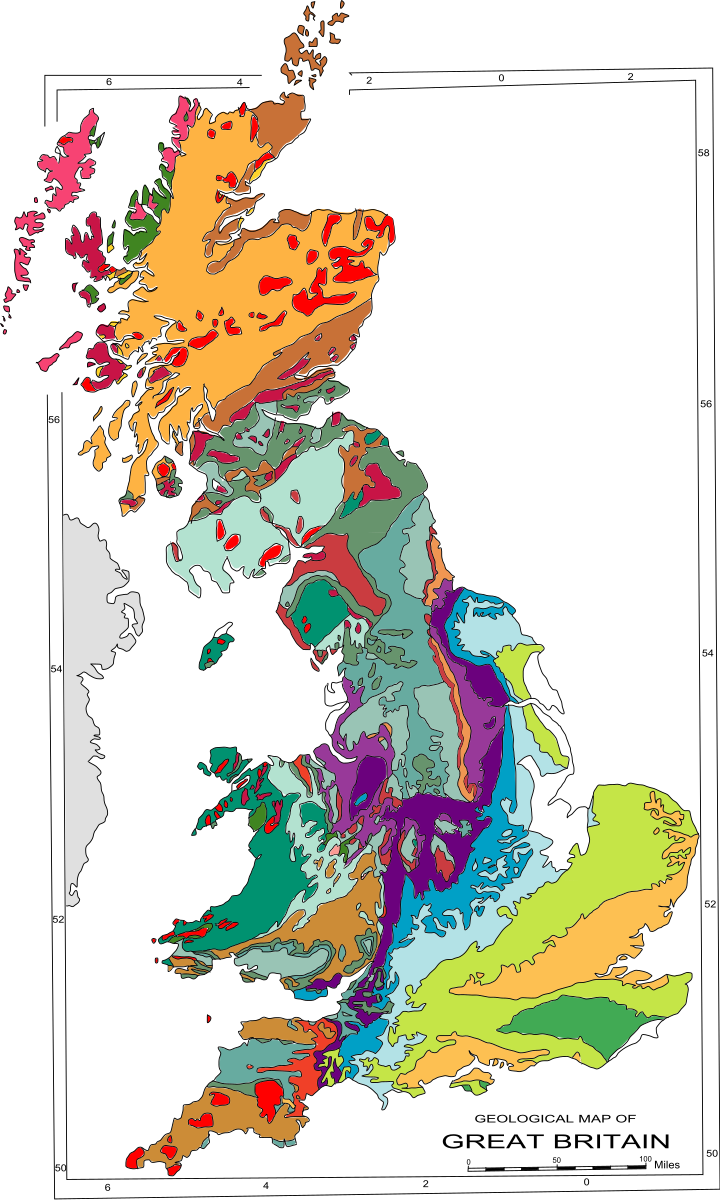
The Essence of Distinguishing Between the Terms
In the intricate tapestry of the British Isles’ history, the distinguishing features of terms like “the United Kingdom”, “Great Britain”, and “England” are not just a matter of semantics but resonate deeply with the unique histories, cultures, and political entities they each represent. The confluence of several sovereign states and territories necessitates a clear understanding and distinction of these terms to appreciate the rich and diverse heritage they individually encompass.
Historical Roots and Genesis
The roots of these distinct terms trace back to different epochs in history, with “England” being one of the earliest established territories, originally inhabited by the Anglo-Saxons. The term “Great Britain”, however, emerged later, symbolizing the political and geographical union of England, Scotland, and Wales. The evolution didn’t stop here; the formation of the “United Kingdom” marked a significant milestone, incorporating Northern Ireland into the fold, thus fostering a more united, albeit diverse entity.
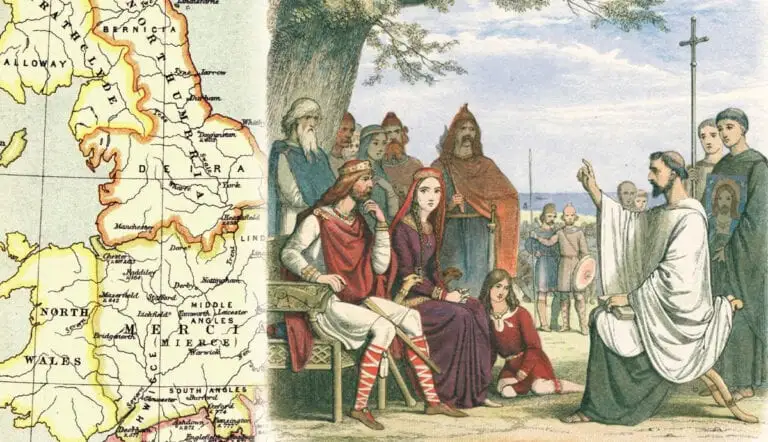
Cultural Tapestry and Traditions
Culture and tradition play a pivotal role in differentiating these terms. England, with its rich history, hosts a culture deeply entrenched in traditions dating back centuries. On the other hand, Scotland, Wales, and Northern Ireland, too, boast of vibrant cultures that are both unique and rich in heritage. Recognizing these terms’ nuances aids in appreciating the diversity and unity that coexists in this region, fostering a sense of respect and acknowledgment for the individual histories and contributions each region brings to the table.
Modern-Day Repercussions
In today’s globalized world, understanding the intricate differences between these terms holds significant value. It aids in fostering diplomatic relations, enhancing tourism, and promoting a more inclusive representation of the region’s diverse demographic. Moreover, it assists in averting any potential misunderstandings or misconceptions, promoting a narrative that is both respectful and informed.
To summarize
Consequently, Great Britain serves dual roles in our lexicon: it acts as a geographical label pinpointing the island frequently identified as Britain, and simultaneously stands as a political descriptor, encapsulating the territories of England, Scotland, and Wales, along with their respective administered islands like the Isle of Wight. Contrarily, the term “United Kingdom” embodies a solely political dimension, representing the sovereign state that integrates the entirety of Great Britain and the region presently recognized as Northern Ireland.
Differences Between the United Kingdom, Great Britain and England
England: The Birthplace of Shakespeare and The Beatles
Situated at the heart of Great Britain, England has been the cradle of numerous iconic figures and movements that have shaped the cultural panorama of the modern world. As the birthplace of the prodigious playwright Shakespeare and the legendary band The Beatles, England holds a rich tapestry of history and culture that continues to allure people globally.
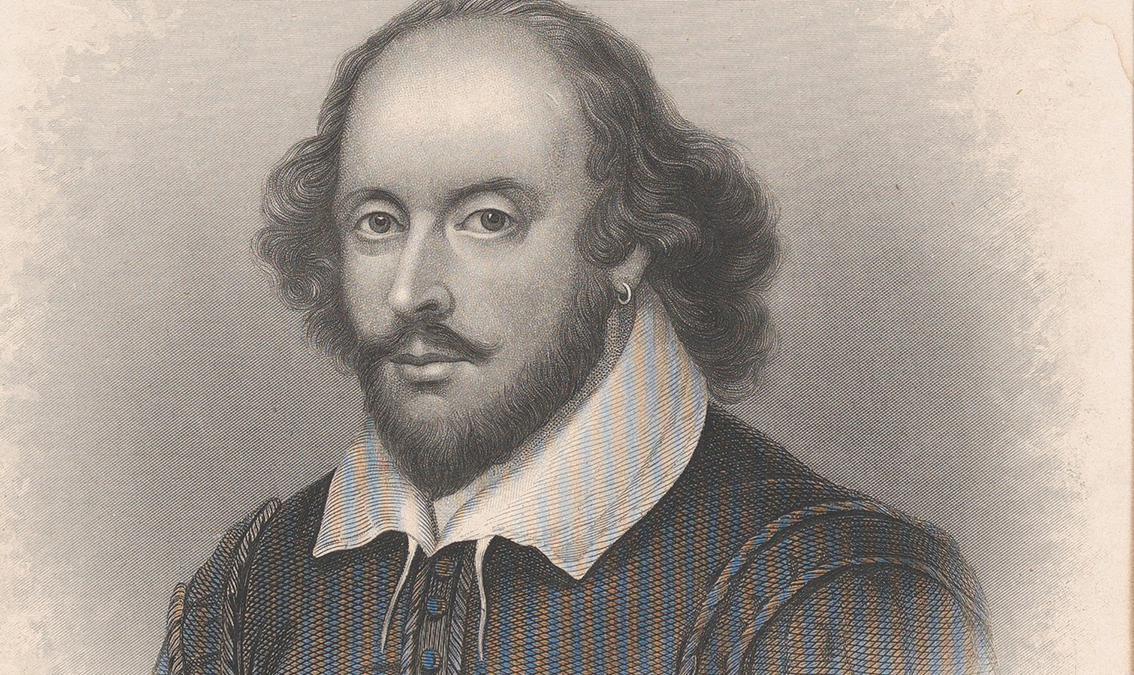
A Glimpse into its Prime Location
England, the largest country within the United Kingdom, stretches out predominantly over the southern part of the island of Great Britain, sharing its borders with Scotland to the north, and Wales to the west. The nation is bathed by the North Sea to its east and the Atlantic Ocean to its south, offering a rich variety of landscapes and natural resources. Its prime location has allowed it to foster significant relationships with neighboring countries, making it a hub of economic and cultural exchanges. Furthermore, its extensive coastline and picturesque countryside have been a source of inspiration for artists and writers for centuries, serving as the picturesque backdrop for many globally acclaimed works of art and literature.
The Essence of England: Core Components
Historical Heritage
England’s history is a remarkable blend of ancient civilizations, regal dynasties, and landmark events that have shaped the world. Its roots can be traced back to the Roman conquest, through the medieval period characterized by feudalism and the monarchy’s dominance. This rich historical backdrop provides a stage for a vibrant tapestry of stories and legends, encompassing King Arthur’s legends and the iconic rule of monarchs like Queen Elizabeth I.
Cultural Vibrancy
England’s cultural landscape is as diverse as its history. The nation gave birth to Shakespeare, whose literary prowess reshaped the realms of drama and poetry. Furthermore, the 1960s saw the rise of The Beatles, a band from Liverpool that revolutionized the music industry globally. Their legacy, along with many others, forms a critical component of England’s modern cultural identity, characterized by innovation, diversity, and a deep-seated appreciation for the arts.
Modern Society
In contemporary times, England stands as a beacon of modernity and progress. Its capital, London, is a bustling metropolis, home to a blend of historic landmarks like the Tower of London and modern structures such as The Shard. Moreover, England’s education system, with institutions like Oxford and Cambridge, continues to set standards of excellence in higher education worldwide.
Natural Beauty
England’s geographical diversity is manifested through its stunning natural landscapes, from the rolling hills of the Cotswolds to the rugged coastlines of Cornwall. These natural beauties not only offer breathtaking vistas but also play a significant role in the nation’s tourism and recreation sectors, drawing visitors from around the world to witness the tranquil beauty that England has to offer.
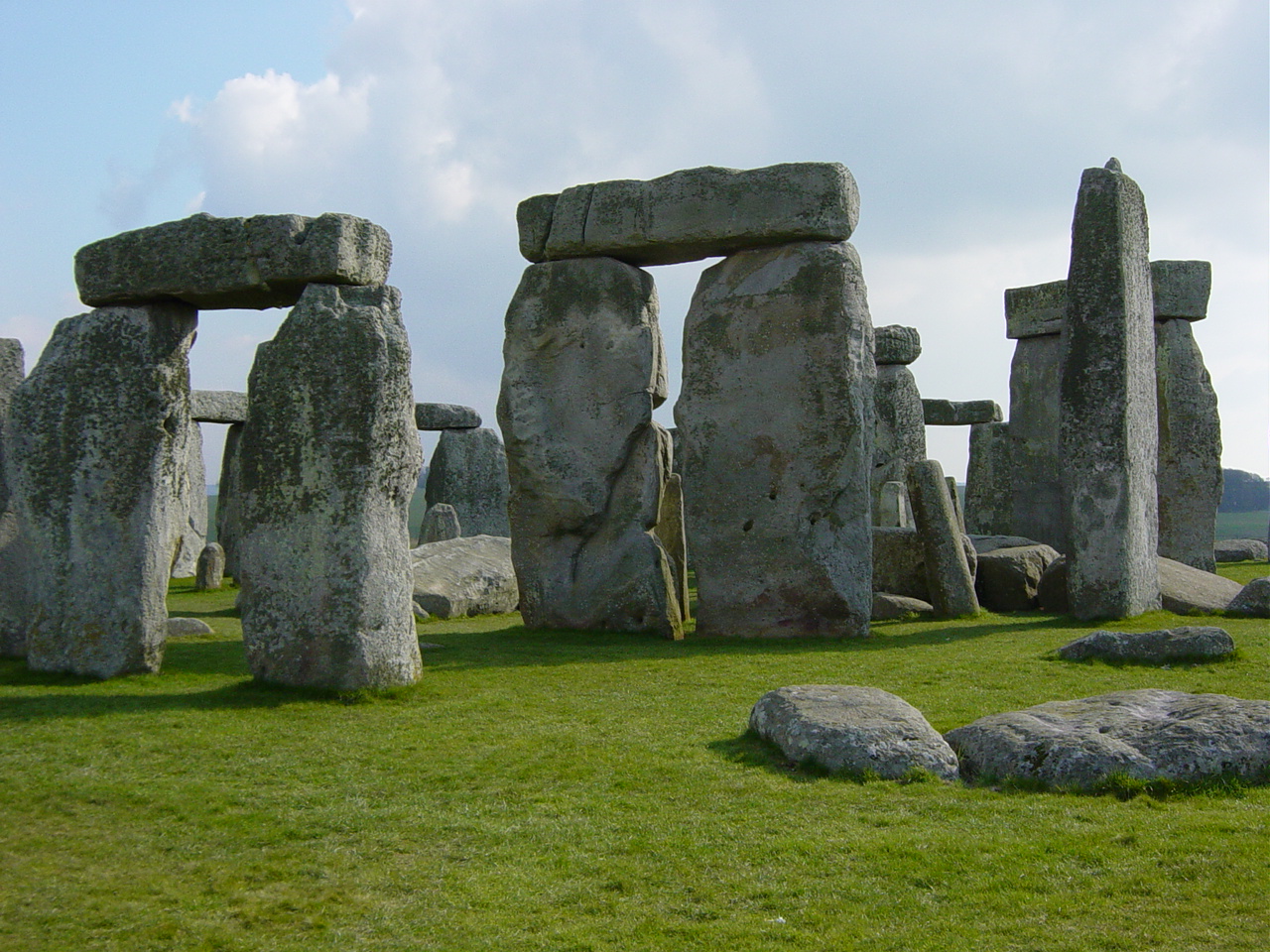
Great Britain: More Than Just a Piece of Land
Great Britain, often just referred to as Britain, is not merely a geographical entity but a rich canvas that embodies a vibrant blend of cultures, histories, and innovations. It stands as a testament to the unity and diversity that exists among the nations that call it home. Here, we delve deeper into the aspects that make Great Britain much more than just a piece of land:
Unlocking the Secrets of its Geographic Location
Geographic Majesty
Nestled in the north-western part of Europe, Great Britain is the largest of the British Isles, surrounded by the Atlantic Ocean, the North Sea, and the English Channel. This strategic location not only offers breathtaking sceneries and diverse ecosystems but has also been a vantage point that facilitated trade, cultural exchanges, and maritime dominance throughout history.
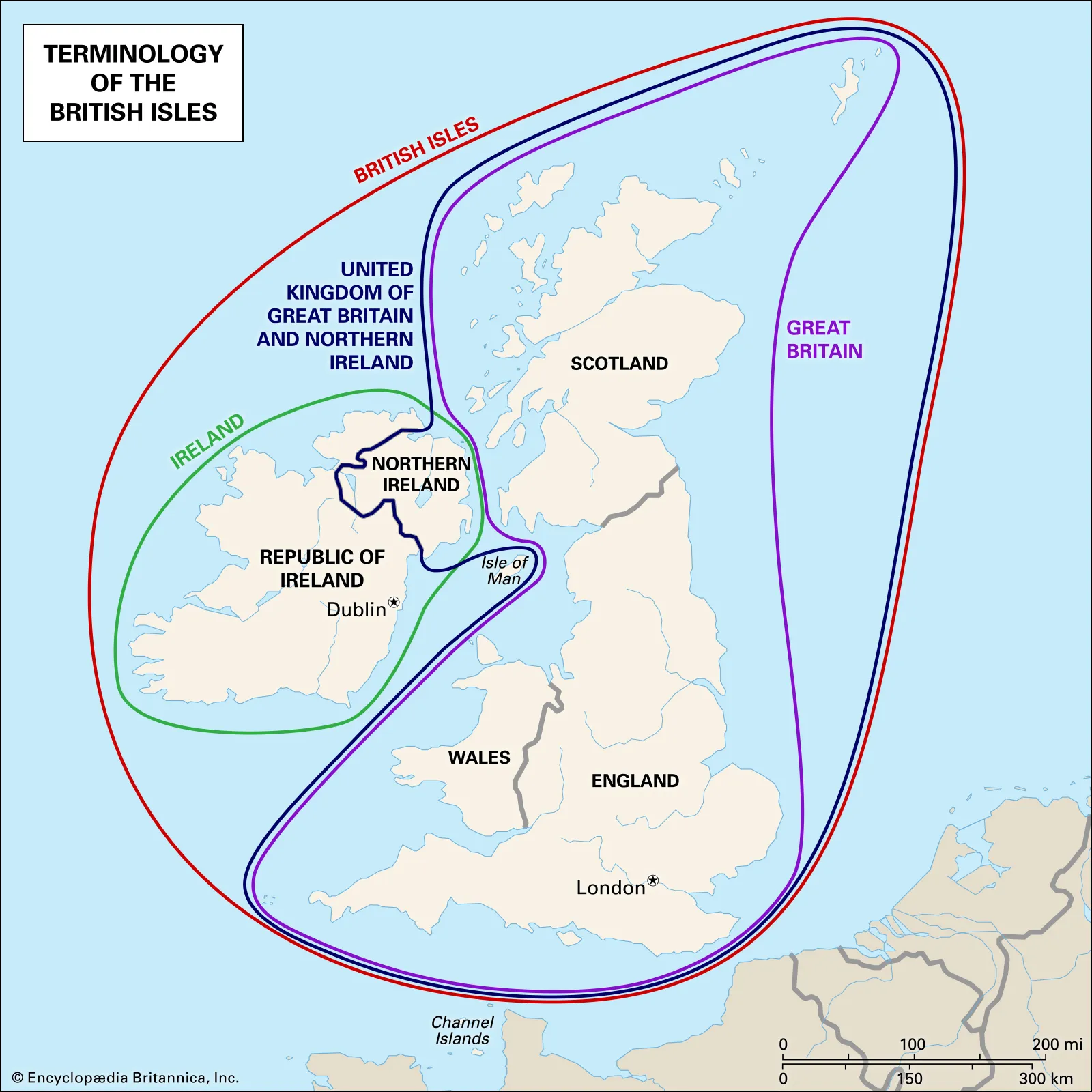
Natural Wealth
Great Britain is a trove of natural riches, with a terrain that varies dramatically from the highlands of Scotland to the lowlands of England. The region is dotted with natural parks, ancient forests, and picturesque lakes that attract nature enthusiasts and tourists alike. Its rich geographic diversity provides a nurturing ground for a variety of flora and fauna, marking it as a unique destination for nature exploration.
A Melting Pot of Distinct Nations
Historical Intertwining
The very essence of Great Britain lies in the confluence of distinct nations – England, Scotland, and Wales – each with its own rich history, culture, and traditions. Over the centuries, these nations have intertwined, creating a complex yet harmonious tapestry of shared experiences and mutual influences, while maintaining their unique identities.
Cultural Symphony
Great Britain stands as a beacon of cultural diversity, where ancient traditions meet modern influences. From the poetic highlands of Scotland to the vibrant festivals of Wales, and the rich literary heritage of England, Great Britain is a cultural symphony that resonates with unity in diversity. The fusion of various cultural elements has birthed a rich and varied cultural milieu that is revered globally.
Collaborative Progress
In the modern era, Great Britain epitomizes collaborative progress, where nations work hand in hand to foster advancements in various fields, including technology, medicine, and education. The region is home to world-renowned universities and research institutions, testament to its commitment to fostering knowledge and innovation.
Conclusion
Great Britain is not just a geographical designation; it is a living, breathing entity that encapsulates the richness of diverse cultures, histories, and forward-thinking ideologies. Its geographic location serves as a gateway to a world where tradition and modernity coalesce, offering a glimpse into a unique blend of unity and diversity that has stood the test of time.
The United Kingdom: A Union Formed from Historical Ties
The United Kingdom stands as a monumental testament to the intricate web of historical connections that have forged a union of distinct nations, each with its own rich lineage and cultural ethos. This entity is not just a country, but a vivid tapestry of histories interwoven, bound by historical ties and mutual progress. Let’s delve deeper into the essence of the United Kingdom:
An Overview of its Prime Location
Strategic Locale
Situated off the north-western coast of mainland Europe, the United Kingdom enjoys a strategic position that has historically facilitated significant maritime prowess and global influence. Its geographical outreach, encompassing Great Britain and a portion of Ireland, is surrounded by the Atlantic Ocean, the North Sea, the English Channel, and the Irish Sea, forming a natural barrier and a conduit for commerce and cultural exchanges.
Biodiversity and Natural Splendors
The United Kingdom’s geography is marked by a rich array of natural landscapes, ranging from the verdant hills and valleys to bustling coastal cities. Its diverse ecosystems house an array of flora and fauna, offering spectacular vistas and natural resources that have been pivotal in shaping the country’s history and economy.
Unveiling the Constituent Countries
Historical Unison
The United Kingdom, a sovereign state, is a harmonious congregation of four constituent countries: England, Scotland, Wales, and Northern Ireland. These nations, bound by history, have woven a rich tapestry of shared experiences, while preserving their unique traditions and cultural identities. The formation of this union marked a significant milestone in fostering cooperation and mutual development.
Cultural Mosaic
Each constituent country of the United Kingdom brings a vibrant cultural contribution to the union. From the rich literary traditions of England and the spirited folklore of Scotland to the melodious hymns of Wales and the resilient spirit of Northern Ireland, the UK stands as a cultural mosaic, offering a rich and diverse cultural experience that is both unique and harmonious.
Synergistic Development
In modern times, the United Kingdom has emerged as a hub of synergistic development, fostering advancements in various sectors including technology, healthcare, and education. The collaborative efforts among the constituent countries have propelled the region to the forefront of global advancements, showcasing a model of unity, diversity, and mutual progress.
Conclusion
The United Kingdom embodies a rich narrative of unity forged through historical ties, where distinct nations have come together to form a sovereign state that is globally renowned for its cultural richness, historical heritage, and forward-thinking approach. As we explore its prime location and unveil the intricacies of its constituent countries, we witness a dynamic entity that thrives on diversity and is united in its journey towards a prosperous future.
Journey Through Time: The Historical Chronicles
The Birth of Great Britain: A Fusion of Nations
Ancient Beginnings
The inception of Great Britain can be traced back to a time when separate tribes and kingdoms ruled over different parts of the British Isles. These realms, rich with their own cultures and traditions, were the forebears of the nations we know today as England, Scotland, and Wales.
Formation through Unity
The historical journey of Great Britain is marked by a series of unifications that commenced with the coming together of England and Wales, following the annexation of Wales by the Kingdom of England during the 16th century. This period witnessed the seeding of a larger entity, laying the groundwork for a united nation that would encompass a rich and diverse cultural and historical landscape.
Scottish Integration
A monumental chapter in the chronicles of Great Britain was the unification with Scotland, a process formalized in the early 18th century through the Acts of Union. This marked the creation of the Kingdom of Great Britain, a fusion that not only expanded territories but also brought together a wealth of traditions, languages, and histories, making Great Britain a hub of cultural amalgamation.
Cultural and Historical Synthesis
The fusion of these nations did not just signify a political and territorial consolidation but also heralded the intertwining of distinct cultures, traditions, and historical narratives. This melding crafted a rich tapestry where ancient lore, linguistic varieties, and traditions coalesced, offering a rich and diverse milieu that has become the hallmark of modern Great Britain.
The United Kingdom: From Historical Roots to Modern Times
Emergence of a Sovereign State
In the wake of the birth of Great Britain, the journey towards the formation of the United Kingdom embarked on its course. This voyage took a significant step forward in the early 19th century, when the island of Ireland merged with Great Britain, marking the inception of the United Kingdom of Great Britain and Ireland, as per the directives of the Acts of Union 1800.
Partition and Adaptation
The landscape of the United Kingdom underwent a crucial transformation in the 20th century, characterized by the partition of Ireland in 1921. This event led to the emergence of Northern Ireland as an integral component of the UK, whereas the southern part of Ireland paved its path to become the independent Republic of Ireland. Consequently, the name of the state transitioned to the United Kingdom of Great Britain and Northern Ireland, encapsulating its present form.
Thriving in Modern Times: A Spectrum of Progress
A Hub of Innovation and Development
In the contemporary era, the United Kingdom has emerged as a bastion of innovation and development, spearheading advancements in numerous fields such as science, technology, and finance. Its capital, London, serves as a global hub for business and culture, echoing the nation’s vibrant heritage while encapsulating a modern and progressive spirit.
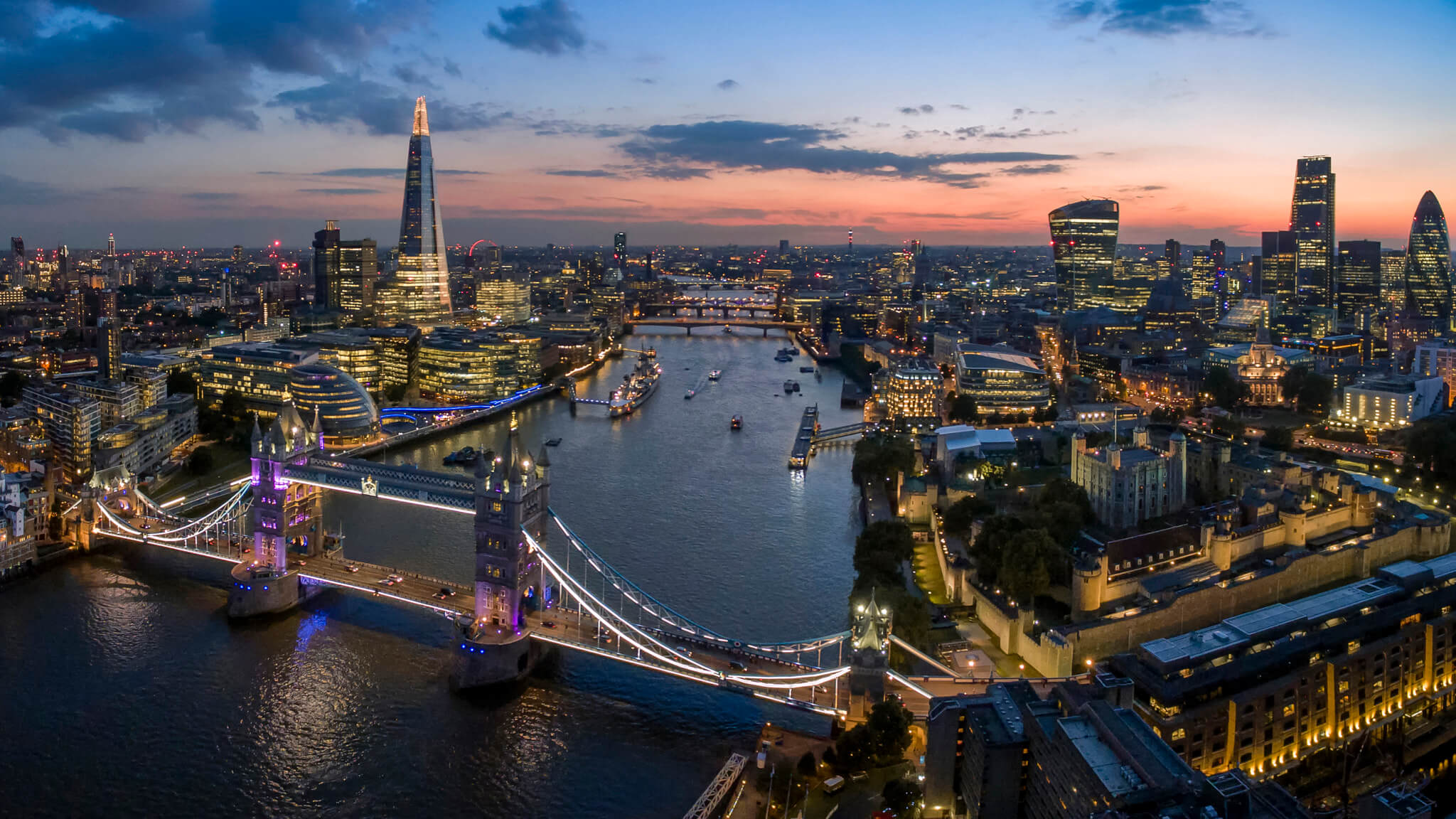
Cultural Renaissance
The United Kingdom is a fertile ground for a cultural renaissance, nurturing a rich and diverse artistic heritage. From the legacy of literary giants like Shakespeare and Dickens to the revolutionary beats of The Beatles, the UK stands as a beacon of cultural richness, fostering creativity and innovation in the arts.
Global Influence
As a significant player on the global stage, the United Kingdom holds a prominent position in various international organizations, including the United Nations and the Commonwealth. Its influence permeates various spheres, including politics, economics, and culture, marking its stature as a global leader with a far-reaching impact.
The Vibrant Tapestry of Cultural Diversity
Language: The Melodic Harmony of Various Accents
An Orchestra of Languages
The linguistic terrain of the UK is akin to a grand orchestra where different languages play harmoniously, each bringing its unique notes to create a melodious symphony. This symphony comprises languages that have ancient roots and those that have found their way to the region through centuries of migration and cultural exchanges.
The Principal Players: English, Welsh, Scottish Gaelic, and Irish
- English: The dominant language, English, traces its roots to Anglo-Saxon heritage. It has assimilated influences from various languages over centuries, giving rise to a plethora of accents and dialects that vary remarkably across different regions.
- Welsh: A language of Celtic origin, Welsh, breathes life in Wales. It’s a language steeped in history and folklore, offering a rich linguistic experience that resonates deeply with the native populace.
- Scottish Gaelic: In the rugged landscapes of Scotland, Scottish Gaelic stands as a testament to the region’s Celtic heritage. Its melodious tones and unique script make it a vibrant part of Scotland’s cultural identity.
- Irish: In Northern Ireland, the Irish language, also of Celtic origin, echoes in communities, preserving a rich linguistic tradition that intertwines deeply with Irish history and mythology.
Regional Accents: A Fascinating Study in Diversity
The UK is a fascinating ground for linguists owing to the multitude of regional accents that narrate stories of historical influences and regional characteristics. From the sophisticated tones of Received Pronunciation to the warm and melodious Welsh accents, the UK offers a rich linguistic tapestry that is both charming and diverse.
Modern Influences: A Melting Pot of Linguistic Trends
In the modern era, the linguistic landscape of the UK is continually evolving, influenced by global trends, migration, and the integration of various cultures. This phenomenon has given rise to a dynamic and ever-changing linguistic environment, where new accents and dialects are constantly emerging, adding vibrant notes to the already rich linguistic symphony.
Traditions: A Rich Mosaic of Time-Honored Customs
Festivals and Celebrations
- Christmas: A quintessential festival that is celebrated with fervor and joy, encapsulating traditions like the Christmas dinner, the Queen’s Christmas message, and the exchange of gifts.
- Easter: This Christian festival is marked with unique customs like Easter egg hunts and the indulgence in traditional treats like hot cross buns.
- Guy Fawkes Night: A celebration deeply rooted in the history of England, this event is marked by grand fireworks displays and the burning of the “Guy” effigy, narrating tales from the gunpowder plot of 1605.
Traditional Attire
- Kilts and Tartans: In Scotland, the tradition of wearing kilts and tartans holds a special place, with specific patterns representing different clans, narrating stories of heritage and pride.
- Welsh National Dress: In Wales, the traditional attire, with its distinctive hats and gowns, paints a vivid picture of the nation’s rich cultural history.
Music and Dance
- Bagpipes: The haunting melodies of the Scottish bagpipes resonate deeply with the rich musical traditions of the region, echoing through the highlands as a testament to Scotland’s vibrant cultural tapestry.
- Morris Dancing: In England, the tradition of Morris dancing, with its colourful costumes and rhythmic movements, narrates tales of seasonal celebrations and community bonding.
Culinary Traditions
- Afternoon Tea: A quintessentially British tradition, the afternoon tea embodies the grace and elegance of British culture, offering a delightful gastronomic experience with its assortment of teas, sandwiches, and pastries.
- Sunday Roast: A staple in British households, the tradition of Sunday roast brings families together, fostering community bonds and offering a hearty culinary experience steeped in history.
Steering the Ship: The Political Landscape
England: The Nexus of Historic Governance
Foundation Stones: Early Political Developments
England’s political history is rich and multifaceted, rooted in the foundations laid by early Anglo-Saxon governance structures. This period saw the establishment of various kingdoms, each governed by its own set of rules and principles, paving the way for a rich tapestry of political narratives.
The Magna Carta: A Beacon of Liberty
In 1215, a significant milestone in the history of governance was achieved with the sealing of the Magna Carta. This monumental document, a beacon of liberty, established the principle that everyone, including the king, was subject to the law. It marked a shift towards constitutional governance, laying the groundwork for modern democratic principles.
Parliamentary Democracy: Birth of a Modern Government
The development of parliamentary democracy stands as a significant chapter in England’s political journey. The establishment of the House of Commons and the House of Lords, coupled with the monarch’s role, forms a unique governmental structure that balances power and fosters participative governance. This system has evolved over centuries, fine-tuned to adapt to changing socio-political dynamics.
Modern Political Landscape: A Blend of Tradition and Modernity
In the modern era, England’s political landscape is characterized by a blend of tradition and modernity. The governance structure, deeply rooted in historic principles, continues to function within the framework of a constitutional monarchy. This structure ensures a stable political environment, complemented by a robust legal system that upholds the principles of justice, equality, and liberty.
England and the UK: Playing a Pivotal Role
England, being the largest country in the UK, plays a pivotal role in the broader political landscape of the United Kingdom. Its capital, London, serves not only as a national hub but also as a significant player in the global political arena. The policies and decisions formulated here reverberate on a larger scale, influencing the political narratives that shape the UK and, by extension, the world.
Great Britain: A Closer Look at its Political Dynamics
As we continue our voyage through the intricate political landscapes that define the UK, our next port of call is Great Britain – a land that encapsulates England, Scotland, and Wales. Here, we delve deeper into the political dynamics that govern this region, a complex interplay of historical legacies and modern governance structures that paint a vivid portrait of a land steering towards progress and stability.
The Fabric of Governance: Union of Nations
Formation and Evolution
The genesis of Great Britain’s political fabric lies in the historical unifications that brought England, Scotland, and Wales under a singular governance structure. A series of significant treaties, including the Acts of Union in 1707, have played a pivotal role in shaping this united entity, fostering a political environment that thrives on collaboration and shared governance.
Devolved Administrations: Power with Diversity
In the modern landscape, the political dynamics of Great Britain are characterized by a unique structure of devolved administrations. Scotland, Wales, and England retain their distinct identities, each governed by its parliament or assembly, allowing for a governance style that respects regional diversity while promoting cohesive policies.
Scotland: A Distinct Political Identity
- Scottish Parliament: Established in 1999, the Scottish Parliament holds significant powers in areas such as education, health, and justice. It serves as a testament to Scotland’s robust political identity, fostering policies that resonate with the specific needs and aspirations of the Scottish people.
- Nationalist Movements: Scotland’s political narrative is also enriched by vibrant nationalist movements, advocating for greater autonomy and, in some cases, complete independence, weaving a complex yet fascinating thread in the tapestry of Great Britain’s political dynamics.
Wales: A Beacon of Regional Governance
- Welsh Parliament (Senedd): Wales, too, commands a strong political presence within Great Britain, governed by the Welsh Parliament or Senedd. Established in 1999, it oversees areas such as health, education, and local government, echoing the voices and perspectives of the Welsh populace.
- Welsh Nationalism: Much like Scotland, Wales harbours a rich history of nationalist movements, nurturing a political environment that constantly seeks to balance regional aspirations with broader national objectives.
England: The Central Force
Within Great Britain, England stands as the central force, housing the UK’s seat of government. The English political narrative, as explored earlier, significantly influences the broader political dynamics that govern Great Britain, serving as a crucial pillar in this complex governance structure.
The United Kingdom: A Union Governed Under One Flag
As we draw near to the culmination of our explorative journey, we cast our gaze upon the larger entity that encompasses the rich tapestries of England, Scotland, Wales, and Northern Ireland – The United Kingdom. A sovereign state that stands as a testament to unity in diversity, the UK embodies a harmonious blend of varying cultures, traditions, and histories, all governed under the singular, unifying banner of the Union Jack. Here, we delve into the core of the UK’s political landscape, unraveling the threads that weave this union into a cohesive yet dynamically diverse entity.
Formation: A Historical Perspective
Union of the Crowns and the Parliament
The inception of the United Kingdom can be traced back to a series of historical unions, including the Union of the Crowns in 1603 and the subsequent Acts of Union in the 18th century, which integrated the distinct nations of England, Scotland, Wales, and later Northern Ireland, into one cohesive entity. This union marked the birth of a powerful nation, defined by collaborative governance and a unified vision for progress and prosperity.
The Modern Political Landscape
Westminster: The Seat of Power
In the heart of London, the iconic Houses of Parliament at Westminster stand as the epicenter of political activity in the UK. Here, the intricacies of governance are played out daily, with representatives from all corners of the union coming together to forge policies and legislation that shape the nation’s trajectory.
Devolved Governments: Unity with Autonomy
A distinctive feature of the UK’s political dynamics is the presence of devolved governments in Scotland, Wales, and Northern Ireland. This structure allows these nations to exercise a considerable degree of autonomy in specific areas of governance, fostering a system that respects regional diversities while maintaining a united front.
The Monarchy: A Symbolic Figurehead
The British monarchy, currently led by King Charles III, serves as a symbolic figurehead, embodying the rich historical legacy of the UK. While the monarchy’s role is largely ceremonial, it represents the unity and continuity that characterizes the UK’s political landscape.
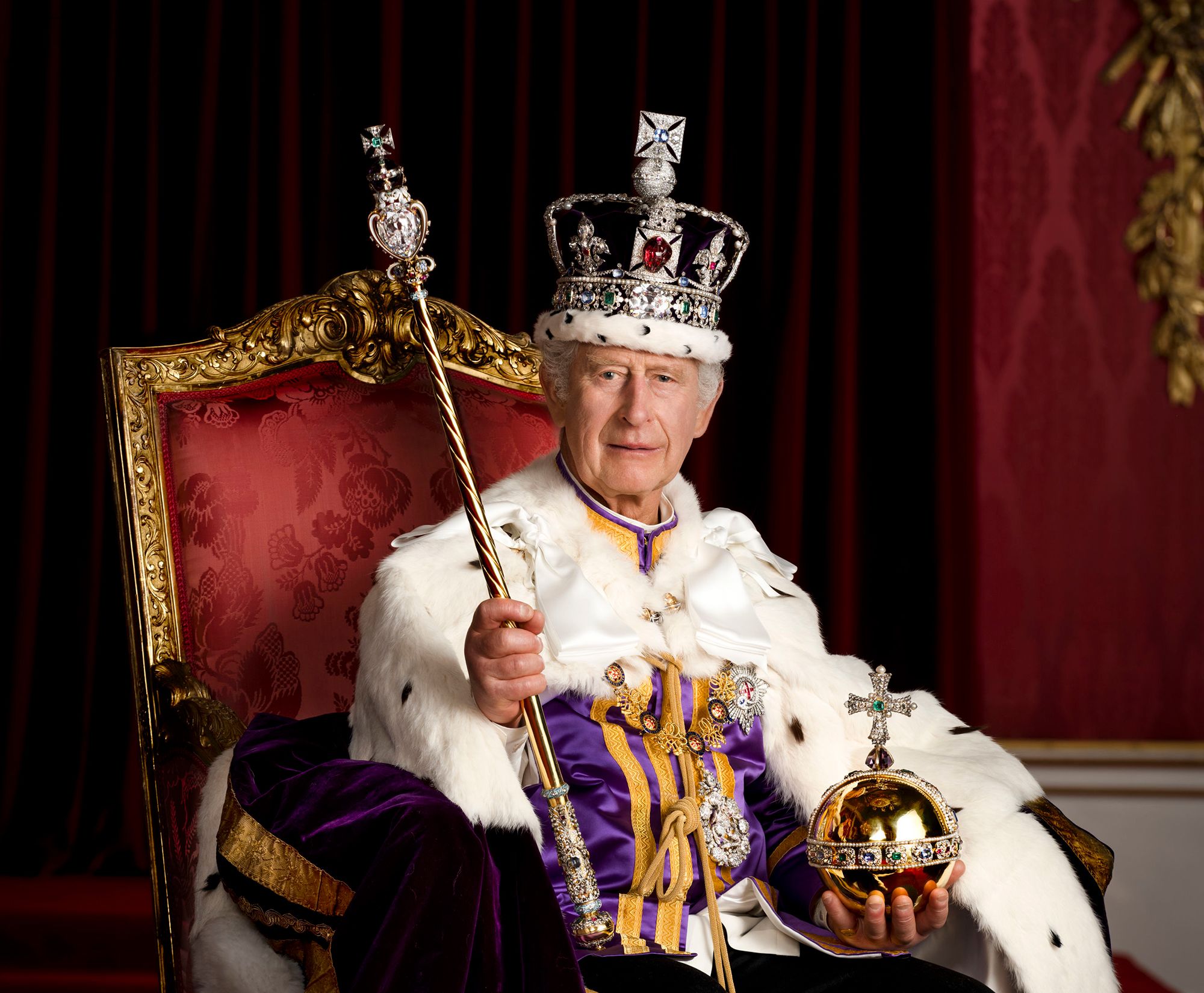
Looking Forward: A Vision for the Future
As the UK sails into the future, it carries with it the rich heritage of its past, steering towards a horizon marked by unity, progress, and innovation. The political landscape of the UK remains a dynamic entity, constantly evolving to meet the challenges of a changing world, yet rooted firmly in the principles of democracy, justice, and equality.
Symbols and Identity: More Than Meets the Eye
Flags: A Canvas of History and Unity
The Union Jack: A Union Embodied
A vibrant amalgamation of the flags of England, Scotland, and Ireland, the Union Jack stands as a vivid representation of the UK’s united front. Its intricate design weaves together the St. George’s Cross of England, the St. Andrew’s Cross of Scotland, and the St. Patrick’s Cross of Ireland, crafting a visual narrative that speaks of unity amidst diversity. The flag serves as a reminder of the historical unions that gave birth to the modern United Kingdom, embodying the spirit of collaboration and unity that defines the nation.
National Flags: Celebrating Individual Identities
Alongside the Union Jack, the individual nations of the UK retain their distinct flags, each narrating their unique historical and cultural tales:
- The St. George’s Cross (England): A bold red cross on a white background, it is a potent symbol of English heritage and identity, echoing tales of valor and the rich history that moulds the English narrative.
- The Saltire (Scotland): A striking white X-shaped cross on a blue background, Scotland’s flag, also known as the Saltire, represents the Scottish identity, encapsulating its distinct historical narrative and cultural pride.
- The Red Dragon (Wales): A majestic red dragon against a field of green and white, the flag of Wales embodies its ancient Celtic heritage and the vibrant folklore that adds depth to the Welsh identity.
- The Ulster Banner (Northern Ireland): Although not officially recognized, the Ulster Banner, characterized by a red cross and a red hand in a star, often serves to represent Northern Ireland, bringing forth its rich heritage and complex history.
Ceremonial and Regional Flags
Beyond the national flags, the UK also hosts a variety of ceremonial and regional flags, each adding a vibrant hue to the colorful tapestry of symbols that define the nation. These flags, often seen during specific ceremonies and events, contribute to the rich mosaic of symbols that narrate the UK’s diverse and unified story.
Reed more: List of English flags
Emblems: The Silent Witnesses of Time
In the mosaic of symbols that encapsulate the rich history and diverse cultures of the United Kingdom, emblems hold a significant place, narrating stories that resonate through time. These symbols, intricately woven into the fabric of the UK, serve as silent witnesses to the historical journeys and cultural narratives that shape the identity of this great nation. Here, we uncover the stories behind the key emblems that stand as pillars of the UK’s collective identity.
Floral Emblems: A Blooming Heritage
Each nation within the UK has a distinctive floral emblem, representing its unique heritage and embodying its cultural spirit:
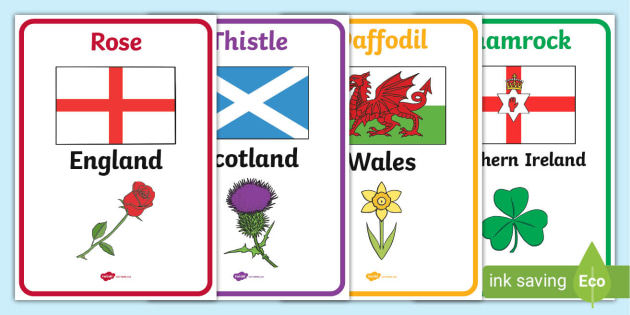
- The Tudor Rose (England): A symbol of grace and beauty, the English rose stands as a timeless emblem of England. Traditionally associated with the House of Tudor, the rose encapsulates England’s historical grandeur and evolving narrative.
- The Thistle (Scotland): The thistle, with its sharp edges and resilient nature, aptly represents Scotland’s historical narrative of bravery and resilience. Rooted deeply in folklore, it stands as a testimony to Scotland’s vibrant history and strong spirit.
- The Daffodil (Wales): Wales embraces the daffodil as its floral emblem, a symbol of renewal and a harbinger of spring. Often seen blooming vibrantly, it encapsulates the Welsh spirit of renewal and hope.
- The Shamrock (Northern Ireland): The shamrock, a symbol closely associated with Ireland’s cultural narrative, represents Northern Ireland. This emblem, rooted in legends and historical connections, portrays the rich cultural fabric of Northern Ireland.
Animal Emblems: The Spirit of Nations
Beyond floral emblems, the UK also hosts a series of animal emblems, representing the essence of each nation:
- The Lion (England): Known as the “King of Beasts”, the lion has long been associated with England, symbolizing strength, courage, and nobility, reflective of England’s historical narrative and royal legacy.
- The Unicorn (Scotland): The unicorn, a mythical creature symbolizing purity and strength, represents Scotland. Its presence in the Scottish Royal Arms paints a picture of a nation that values tradition and mystical allure.
- The Dragon (Wales): The Welsh dragon, a vibrant figure that graces the national flag, represents Wales. It is a powerful symbol of ancient heritage, encompassing the spirit of bravery and folklore that defines the Welsh identity.
- The Red Deer (Scotland) and The Red Hand (Northern Ireland): Apart from the unicorn, Scotland is also represented by the red deer, a symbol of the nation’s rich natural heritage. Northern Ireland, on the other hand, often utilizes the emblem of the Red Hand, narrating complex tales of history and regional identity.
As we reach the conclusion of this enlightening journey, it is apparent that the distinctions between the United Kingdom, Great Britain, and England are not only significant but also deeply ingrained in the rich tapestry of histories, cultures, and traditions that have shaped the British Isles. Through the lens of “Mihitravel”, readers have been ushered through time, exploring the unique narratives and vibrant diversities that make these regions remarkable both individually and as a collective.
As we stand at the confluence of history and modernity, it becomes evident that the harmonious coexistence of these territories paints a vivid picture of unity in diversity, a testament to their shared history and aspirations for the future. We hope that this expedition has fostered a deeper understanding and appreciation for the intricacies that define and distinguish the United Kingdom, Great Britain, and England.
Thank you for accompanying us on this voyage of discovery. We look forward to guiding you through more enriching explorations in the future, only on “Mihitravel”.


